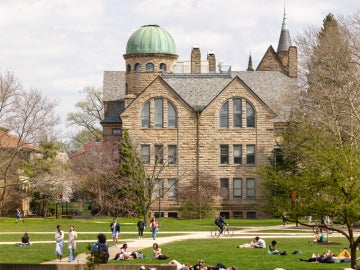College Awards First-Ever Nexial Prize
April 13, 2017
Communications Staff

Adam Chazin-Gray, pictured during his internship with Lawrence Berkeley National Laboratory in summer 2016.
Photo credit: Adam Chazin-Gray
Oberlin College is pleased to announce Adam Chazin-Gray, a biology major with interests in public health, climatology, and infectious disease research, as the inaugural Nexial Prize winner.
The Nexial Prize is a $50,000 award made annually to the member of the graduating class who, in addition to demonstrating excellence as a science major, has also stood out with a serious pursuit of the study of culture. The prize was create by an alumnus acknowledging the contribution Oberlin’s liberal arts education made to his successful career as a scientist and manager, as well as his growth intellectually and culturally. It is meant to emphasize the value of the wide range of skills, knowledge and interests essential to a career of impact.
Chazin-Gray was chosen by a faculty committee from a field of 16 applicants who were nominated by faculty, and each submitted an essay proposing how they will use the Nexial Prize as a stepping-stone to the career path they envision.
“Oberlin College has a proud history of producing outstanding scientists who have gone on to have tremendous impact on their fields and the world,” says Tim Elgren, dean of the College of Arts and Sciences. “A remarkable one percent of the National Academies of Science are Oberlin graduates. Many others have gone on to have extraordinary careers in industry and academia. Unique to Oberlin, there is no other such award in higher education that celebrates a liberally educated scientist and the breadth and depth that a liberally educated scientist brings to the work.”
In his application essay, Chazin-Gray explains the turning point in his Oberlin education in which he realized the importance of looking at complex issues through multiple lenses. Initially a prospective economics major, he was frustrated by limitations of the Gross Domestic Product as an economic indicator in the case of pollution and climate change-related natural disasters such as Hurricane Katrina. He worked with Visiting Professor Ed McKelvey to research alternative measures of economic activity.
When he shifted his academic focus to natural sciences, he learned about the underlying causes of the 2013 Ebola outbreak in his disease ecology class.
“Scientists predict that climate change will have complex and devastating effects on the emergence of infectious disease across the world. My liberal arts training at Oberlin has solidified my belief in taking a multidisciplinary approach to predict, prevent, and mitigate these consequences for global health.”
Within the first three years after graduation, Chazin-Gray plans to use the award funding to acquire knowledge and research experiences in the disciplines of public health, climatology, and microbiology, with the goal of pursuing a dual degree master in public health and doctorate in microbiology and immunology.
“I feel so honored and humbled to receive the Nexial Prize. Personally, this award reinforces all of the hard work that I have put into my academics both in science classes and non-science classes during my four years here. I could not have achieved any of this without the love and support of my family, as well as the guidance from my professors and mentors, including (Professor of Biology) Mary Garvin; Susan Tsutakawa, research scientist at Lawrence Berkeley National labs; Aris Polyzos, research scientist at Lawrence Berkeley National labs; and my uncle, Walter Chazin, director of biochemistry/structural biology at Vanderbilt University.”
Chazin-Gray says he feels a responsibility to use this prize and all of the skills that he gained at Oberlin to make real change.
“Climate change is the issue that I am most passionate about. My Oberlin education has empowered me and taught me the value of using a multidisciplinary approach to address difficult, complex issues like climate change. The Nexial Prize will help me hone this approach to effectively model, understand, and mitigate the potentially devastating effects of climate change.”
A native of Berkeley, California, Chazin-Gray has played for the varsity men’s soccer team all four years. His senior year, he helped the team to a school-best record of 15-4-1, which included the program's first-ever trip to the NCAC Championship match. He was also named a CoSIDA Academic All-American for outstanding academic achievement.
You may also like…
Oberlin Launches Critical AI Studies Minor in Fall 2026
With a solid foundation in both science and the humanities, this minor ensures students to understand and be able to analyze the ethical, cultural, environmental, political, economic, technological, and labor effects of AI.
Chudi Martin Jr. ’24 Earns Prestigious Gates Cambridge Scholarship
Chudi Martin Jr. ’24 earns prestigious Gates Cambridge Scholarship.
Oberlin Named a Top Producer of Fulbright Students for 2025-26
Oberlin College and Conservatory was named a Top Producer of Fulbright students for the 2025-2026 academic year.


